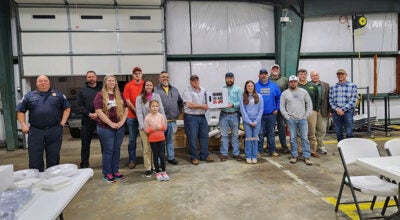Bee losses over winter nearly 60 percent in Virginia
Published 2:15 pm Wednesday, August 22, 2018
|
Getting your Trinity Audio player ready...
|
Elaine Lidholm
RICHMOND
The Virginia Department of Agriculture and Consumer Services has announced that the winter losses of honeybee colonies over the 2017-2018 season were greater than expected and greater than the average of 30 percent per year for the past decade. “The winter losses were 59.5 percent,” said Keith Tignor, State Apiarist. He added that this is the highest rate since 2000 when the state began monitoring winter losses. There was a decrease in colony losses reported for the summer of 2017 when compared to the 2016 summer season.
VDACS staff found high levels of Varroa mites and nosema infections in wintering bees. Both of these maladies shorten the lifespan of worker bees, increasing mortality rates in winter months. Nationally, 30.7 percent of managed colonies in the United States were lost during the winter of 2017-2018. This represents a 9.5 percent increase over the previous year.
Although many groups, including Virginia Tech, are conducting research on honeybee losses, no one cause stands out. It is a combination of environmental conditions, loss of habitat, pests and diseases such as Varroa mites, small hive beetles and nosema, pesticides around beehives and other factors affecting the sustainability of honeybees and other insect pollinators.
VDACS is addressing the problem by encouraging people to become new beekeepers and existing beekeepers to add to their existing hives. The department also encourages homeowners and apartment dwellers to plant pollinator gardens and window boxes. Border plantings of bee friendly plants around crop fields provides needed forage particularly in hot, dry summer months and into the fall. Beekeepers are encouraged to monitor Varroa mites in their hives in July and August; and to take appropriate steps to reduce damaging levels of this honeybee parasite. VDACS also released a Pollinator Protection Plan in June 2017 that focuses on communication between pesticide applicators and beekeepers and the use of best management practices by farmers, beekeepers and pesticide applicators to protect our pollinators.
To learn more about honeybee losses in Virginia and other state see https://bip2.beeinformed.org/loss-map/ or contact Keith Tignor at 804-786-3515.
ELAINE LIDHOLM is the spokeswoman for VDACS. Contact her at 804-786-7686 or www.vdacs.virginia.gov.




